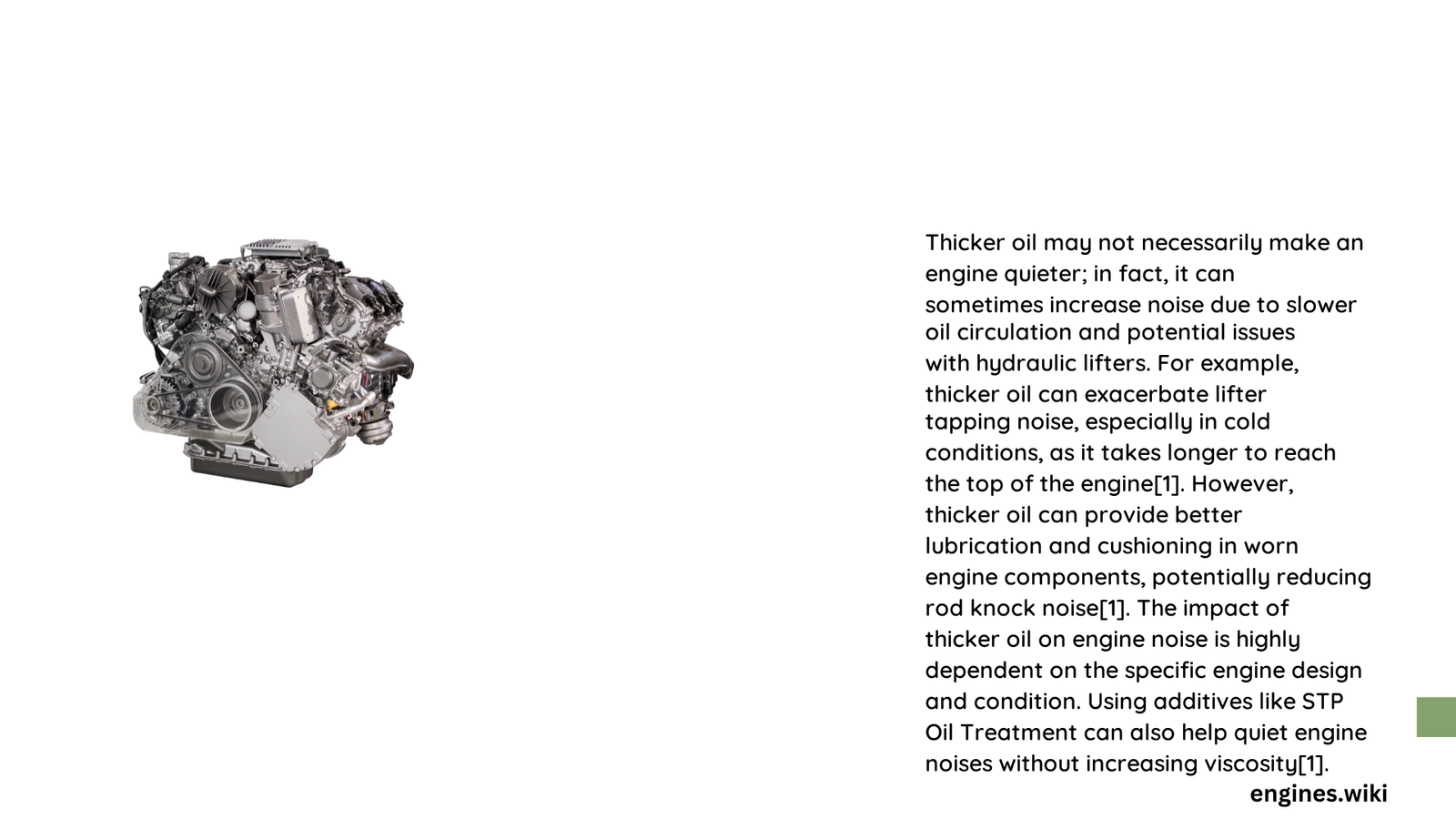Engine noise can be a frustrating issue for vehicle owners, leading many to wonder if changing oil viscosity might provide a solution. Thicker oil potentially offers noise reduction benefits, but the relationship between oil thickness and engine sound is complex, involving multiple mechanical factors such as engine wear, temperature, and component tolerances.\n\n## What Causes Engine Noise in Different Mechanical Components?\n\nEngine noise originates from various mechanical interactions and can stem from multiple sources:\n\n- Hydraulic Lifter Ticking\n- Connecting Rod Wear\n- Valve Train Mechanisms\n- Bearing Surface Interactions\n\n### Will Thicker Oil Reduce Hydraulic Lifter Noise?\n\nContrary to common belief, thicker oil might actually increase lifter noise, particularly during cold starts. The increased viscosity prevents rapid oil circulation, causing extended tapping or ticking sounds until the engine reaches optimal operating temperature.\n\n#### Viscosity Impact Table\n\n| Oil Viscosity | Cold Start Noise | Warm Operation Noise | Wear Protection |\n|————–|—————–|———————|—————-|\n| 5W-30 | Low | Moderate | Standard |\n| 10W-40 | Moderate | Low | Enhanced |\n| 15W-50 | High | Very Low | Maximum |\n\n### How Does Oil Thickness Affect Mechanical Wear?\n\nThicker oils provide several mechanical advantages:\n\n1. Enhanced Lubrication: Creates more robust protective film between moving parts\n2. Reduced Metal-to-Metal Contact: Minimizes friction and potential wear\n3. Better High-Temperature Performance: Maintains consistent viscosity under stress\n\n### What Are Potential Risks of Using Thicker Oil?\n\nWhile thicker oil might seem beneficial, potential drawbacks include:\n\n- Reduced Fuel Efficiency\n- Decreased Engine Performance\n- Potential Seal Compatibility Issues\n- Increased Cold-Start Resistance\n\n### Can Thicker Oil Solve Specific Noise Problems?\n\nSpecific noise scenarios might benefit from strategic oil selection:\n\n- Rod Knock Noise: Thicker oil can temporarily mask sounds by filling larger bearing clearances\n- Valve Train Noise: Moderate viscosity increase might reduce mechanical interactions\n- Older Engines: Higher viscosity oils can provide better protection in worn engines\n\n## Expert Recommendations for Oil Selection\n\nProfessional mechanics suggest:\n\n- Always consult vehicle manufacturer specifications\n- Consider engine age and overall mechanical condition\n- Prioritize recommended viscosity ranges\n- Monitor engine performance after oil changes\n\n### When Should You Consider Oil Viscosity Adjustment?\n\n- Engines with 100,000+ miles\n- High-temperature operating environments\n- Performance or racing applications\n- Vehicles with known mechanical wear\n\n## Final Technical Insights\n\nWhile thicker oil can potentially reduce certain engine noises, it’s not a universal solution. Comprehensive diagnosis by a professional mechanic remains the most reliable approach to addressing persistent engine sounds.\n\n### Recommended Next Steps\n\n1. Perform comprehensive engine diagnostic\n2. Inspect mechanical components\n3. Consult manufacturer recommendations\n4. Consider professional assessment\n\n### References:\n\n- SAE International Oil Viscosity Standards\n- Automotive Lubrication Research\n- Engine Wear Mechanisms Study

